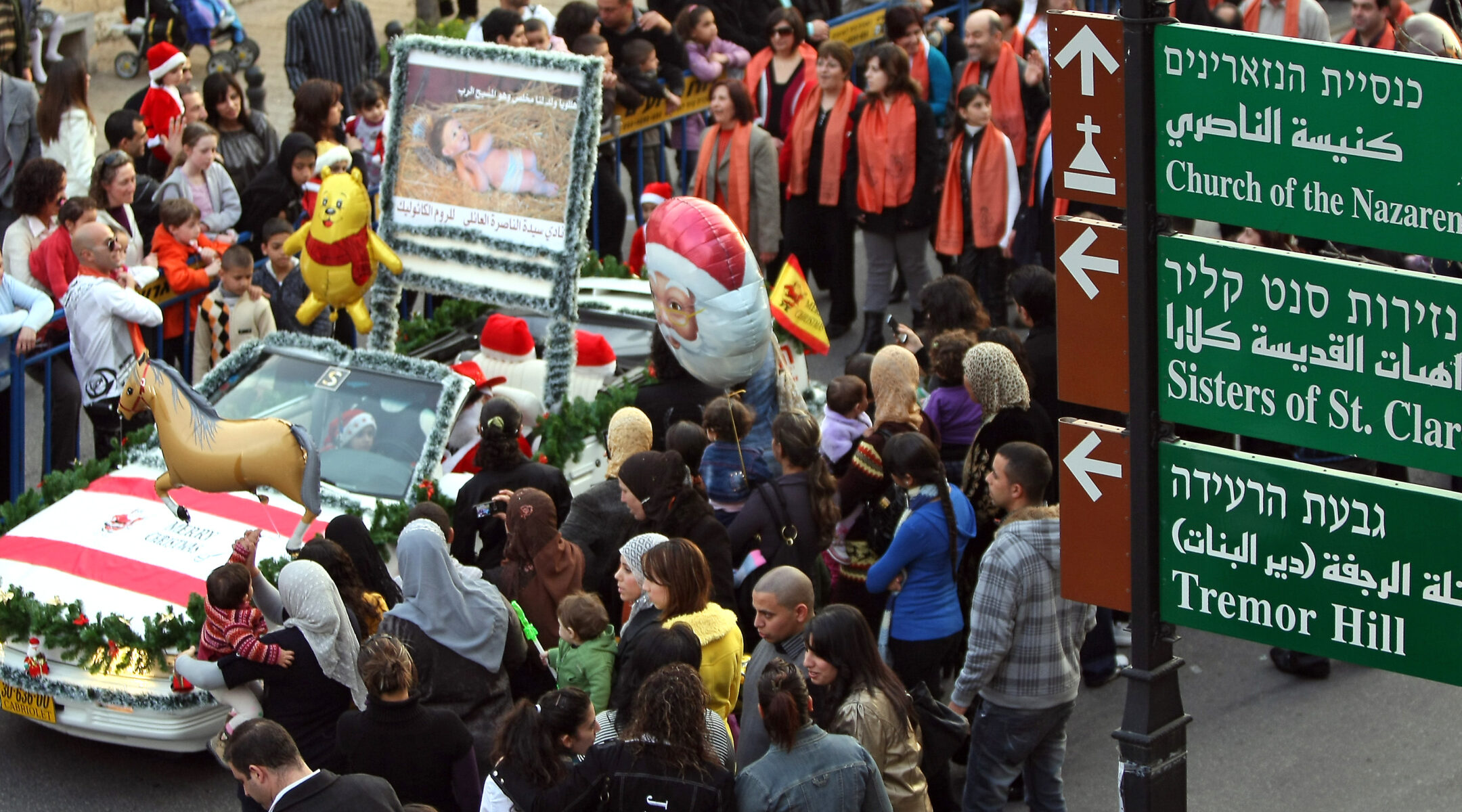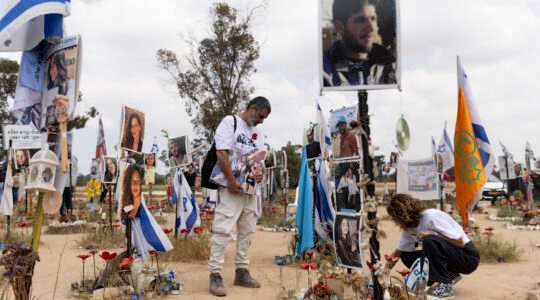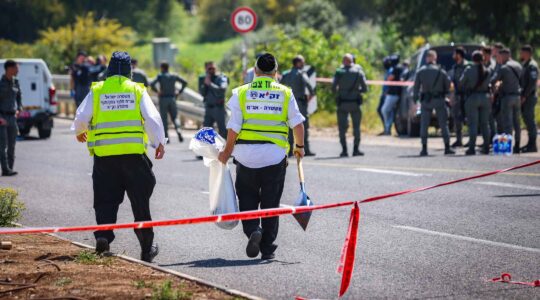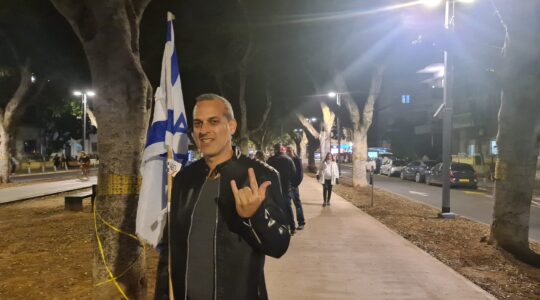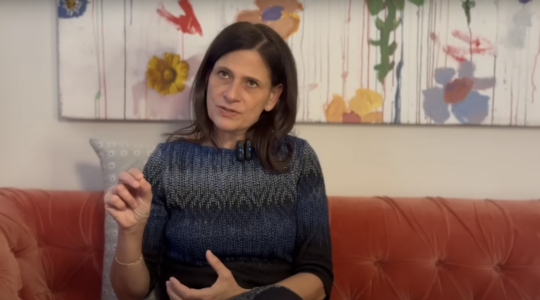(JTA) — Ordinarily at this time of year, Nabil Totry would be gearing up for one of the biggest productions in Nazareth, Jesus’ childhood home and one of several cities across Israel and the West Bank to go all-out for Christmas.
But this year, as the holiday approached, Totry wondered whether his hometown would be able to celebrate. As president of the city’s Christmas Parade, he knew that the war between Israel and Hamas would require some changes.
The parade is a rollicking annual march that begins at Mary’s Well in Nazareth — next to a bustling Christmas market — and continues down Paul VI Street, which boasts the Church of the Annunciation and a Christmas tree rising more than 50 feet in the air. The city generally mounts a fireworks display early in the evening, followed by a midnight Mass Christian prayer service.
“We were ready to begin calling the annual march a ‘March of Peace’ for fraternity, since we see that all people from all religious backgrounds march together side by side,” Totry said. “We thought about how to establish the Christmas march under the present conditions without canceling it.”
But in the end, Totry did call off the parade, and he is not alone. Against the backdrop of the bloodshed in Gaza and Israel, churches in Nazareth and in cities across Israel and the West Bank have canceled their public celebrations of Christmas.
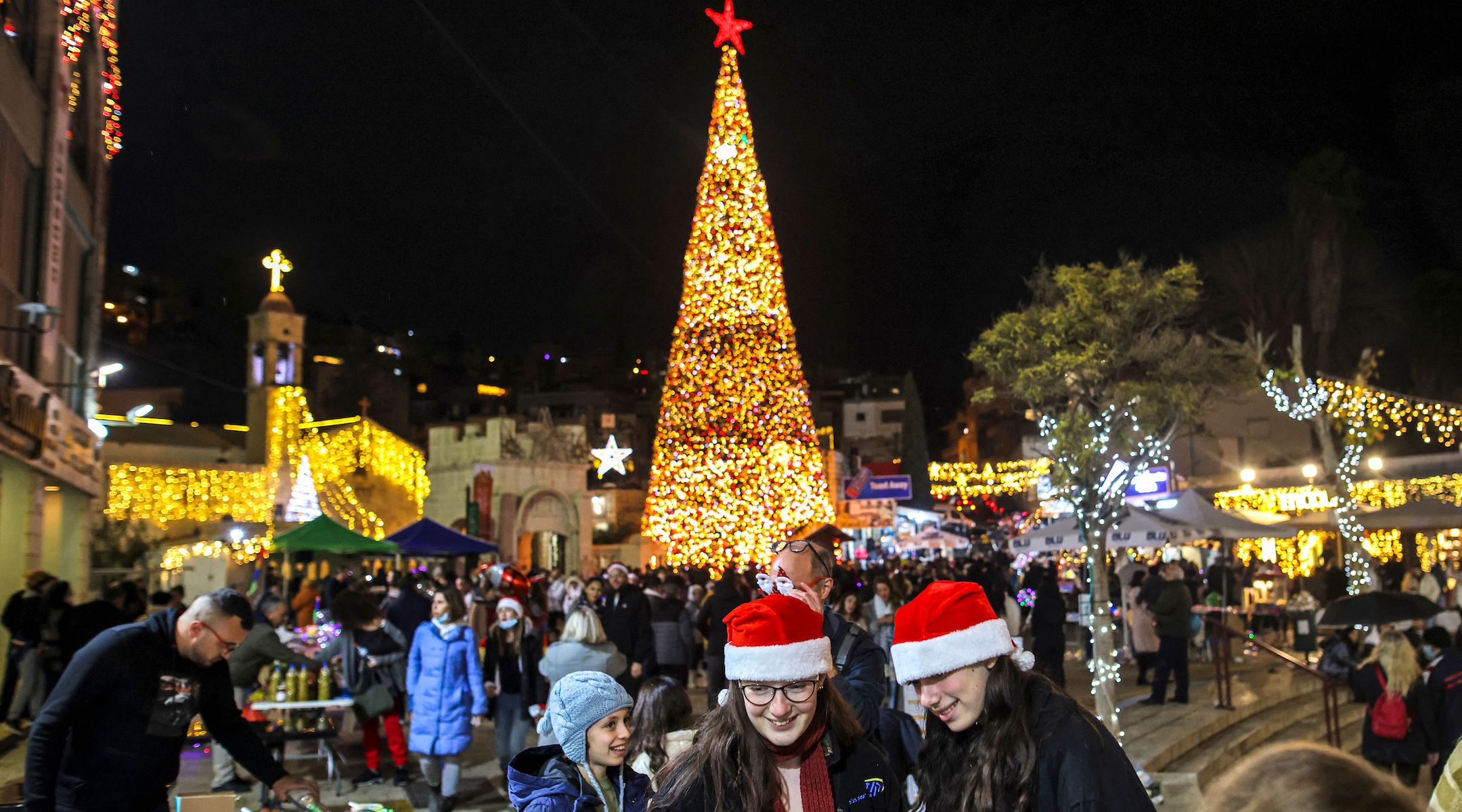
People gathering at Nazareth’s Christmas tree ahead of the holiday in 2021.(Ahmad Gharabli/AFP via Getty Images)
The decisions follow the lead of a consortium of Christian leaders in Jerusalem, who last month asked Christians “to stand strong with those facing such afflictions by this year foregoing any unnecessarily festive activities.” In addition to Nazareth, the call affects celebrations in Jerusalem as well as Bethlehem, revered as Jesus’ birthplace.
“We gathered for several weeks with all the involved organizations to negotiate and decide what was possible in light of the current crisis,” Totry said. “Naturally, there were different opinions because Nazareth in the Christmas season is full of activities as the main address for Arab and Jewish citizens from many areas, and Christmas is considered an important economic source for the city.”
Now, Bethlehem — which is usually a bustling attraction this time of year, with Christmas decorations lining the streets leading to Manger Square, where Christian tradition holds that Jesus was born — is bare and empty. But the spirit of the city, located in the West Bank, is less somber than it is heated.
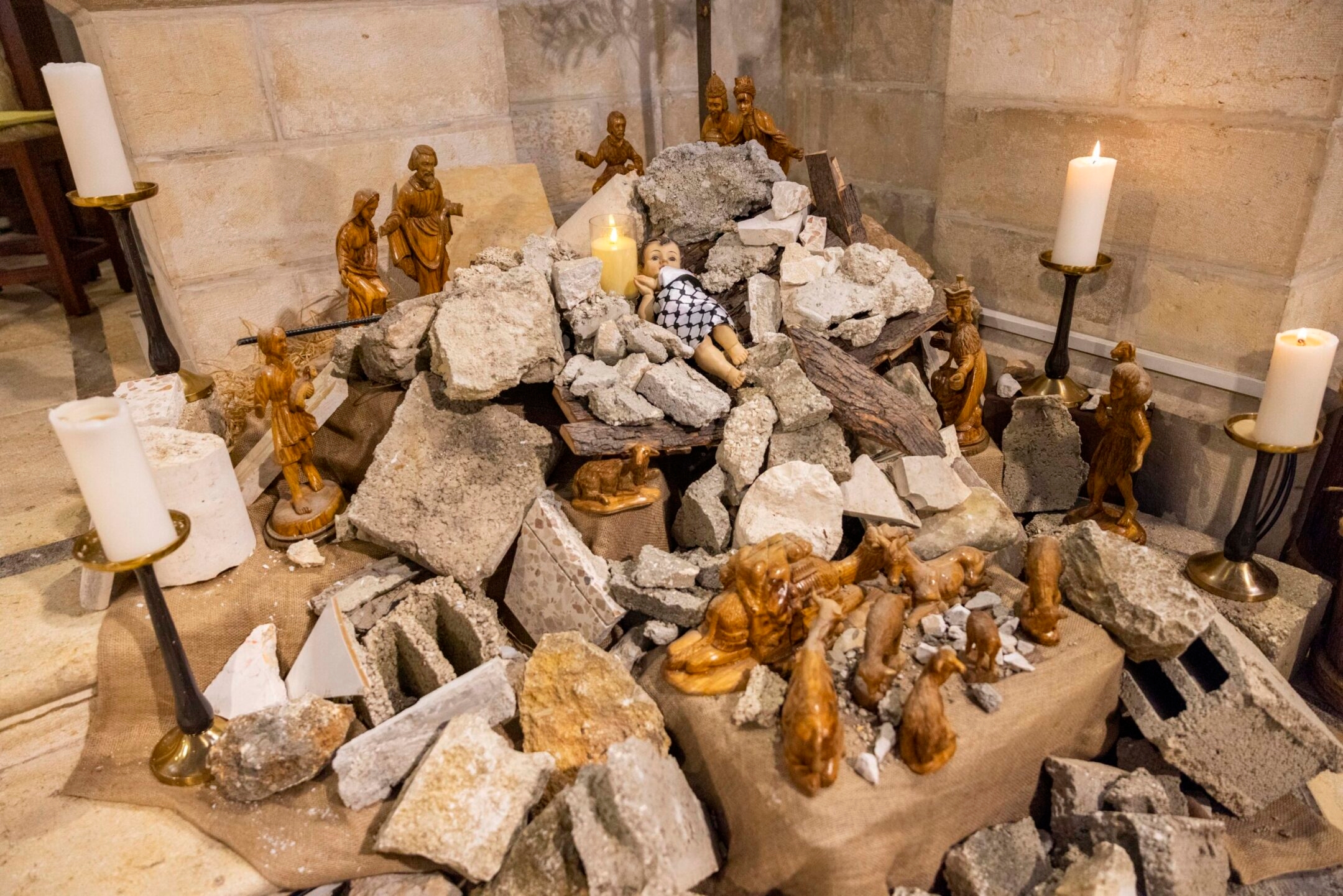
The Nativity scene shows baby Jesus wrapped in a keffiyeh and placed in a pile of rubble to show solidarity with the people of Gaza in the Evangelical Lutheran Christmas Church in Bethlehem, West Bank, Dec. 18, 2023. (Maja Hitij/Getty Images)
Many West Bank Palestinians abhor the war in Gaza, and face increased limits on their freedom of movement coupled with a depressed economy and spiking violence. In a, evocative display that has gained global attention, the Lutheran Church in Bethlehem replaced its traditional nativity manger this year with a depiction of baby Jesus wearing a black-and-white keffiyeh, buried in rubble.
Exacerbating tensions between Israel and the land’s Christians were reports on Saturday of an alleged deadly Israeli attack on a sole Roman Catholic Church in Gaza that has served as a refuge for displaced Christians since the start of the war. Currently, there are approximately 1,000 Christians in Gaza, a drop from a reported figure of 3,000 when Hamas seized control of the strip in 2007.
On Saturday, the Latin Patriarchate of Jerusalem, the Catholic Church’s representative in Israel’s capital, accused Israel of killing a mother and daughter housed at a Catholic church in Gaza. The statement also accused Israel of firing at a convent housing 54 people with disabilities and knocking out its generator. The patriarchate later shared what it said were photos of the attack.
The Israeli army strongly denied the allegations, saying that there were “no reports of a hit on the church, nor civilians being injured or killed.” The IDF added that it “takes claims regarding harm to sensitive sites with the utmost seriousness — especially churches — considering that Christian communities are a minority group in the Middle East.”
So far, the allegations have not been independently verified, and there were no images or video of a funeral for Nahida Anton and her daughter Samar Anton as of Monday.
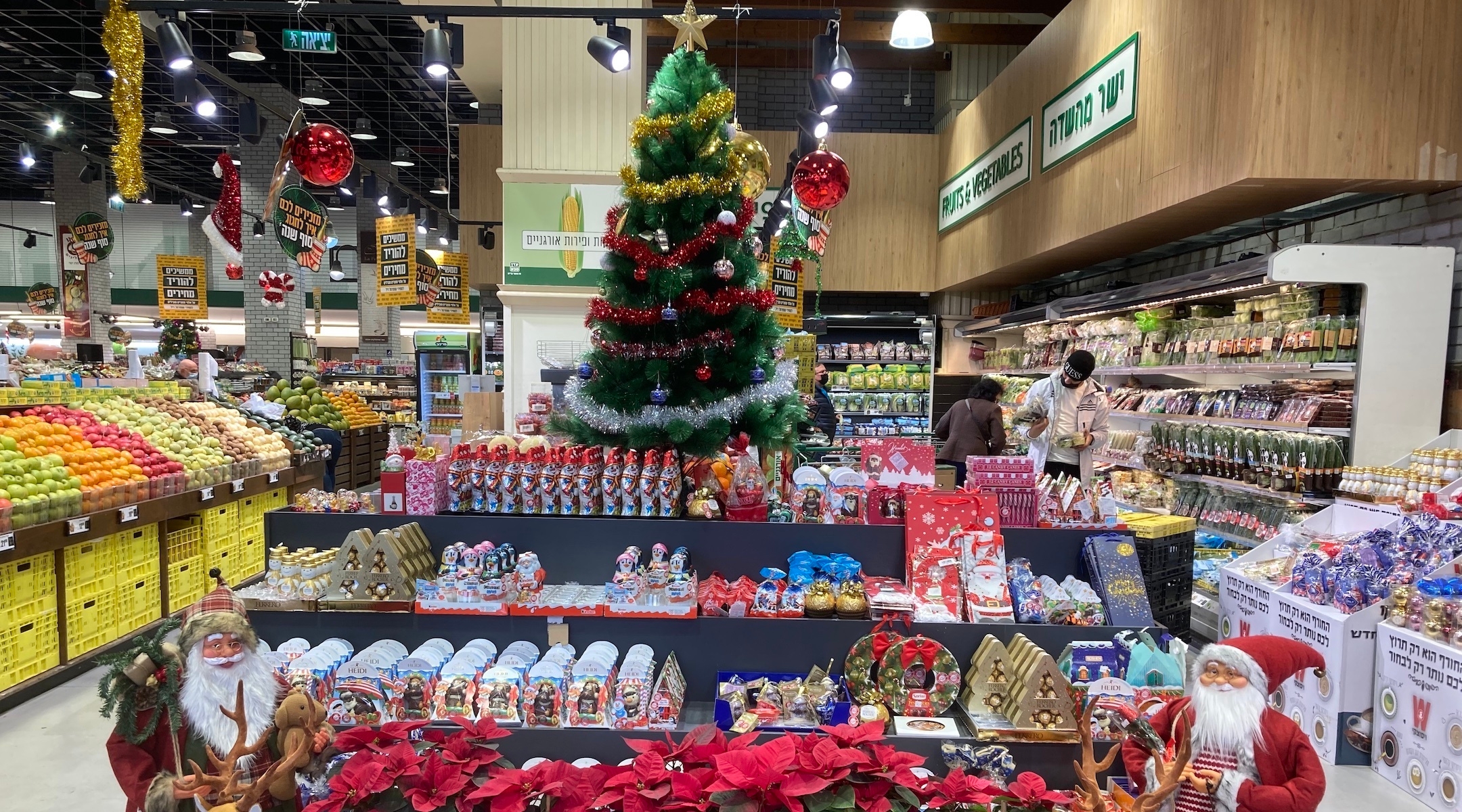
A Christmas display at the entrance to the Tel Aviv flagship store of Tiv Ta’am, an Israeli supermarket chain known for selling food that doesn’t meet kosher dietary rules. (Asaf Shalev)
But in his Sunday sermon, Pope Francis accepted the initial Palestinian reports and condemned any attack on Gaza churches “where there are no terrorists, but families, children, people who are sick and have disabilities, and nuns.” Francis has called for a ceasefire in the conflict.
Meanwhile, as the fighting continues, Christians across the region are preparing for a subdued holiday. Church leaders and city councils in Haifa and Jaffa have also decided not to decorate public spaces with large Christmas trees this year, and to commemorate Christmas in a more ritual fashion. Non-religious Christmas displays, on the rise in recent years among some secular Jews who see them as akin to Halloween decorations, have also been tamped down.
Amir Badran, a member of the Tel-Aviv Jaffa City Council, said, “There is no holiday spirit in the air, in light of the war in Gaza.”
JTA has documented Jewish history in real-time for over a century. Keep our journalism strong by joining us in supporting independent, award-winning reporting.
